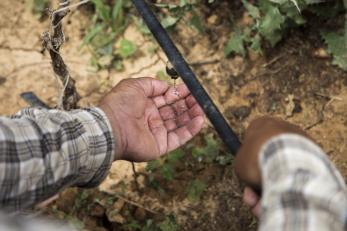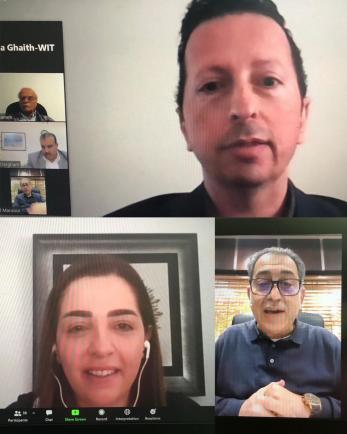USAID Water Innovation Technologies Project Launches Pilot Study on Media Coverage of Water Conservation Issues

Although Jordan has a wide variety of traditional and modern mass media outlets, the quantity and quality of media coverage of water issues is limited and usually does not provide solutions. The USAID Water Innovation Technologies activity works to promote public understanding of water conservation issues and solutions. The activity recognizes the vital role of media in disseminating information and building public awareness on the importance of water as a critical resource, its rational use, and affordable water conservation behaviors, products, and irrigation systems. In partnership with the Center for Defending Freedom of Journalists, the activity launched a pilot study entitled “Jordanian Media Reality in Covering Water Issues and Challenges" to identify the constraints affecting media outlets' delivery of quality messaging around household and farm-level solutions to the water shortages. The study was launched through a virtual event with the participation of Media and Communication Secretary-General Assistant at the Ministry of Water and Irrigation, water experts, environmental journalists, and other sector actors.
The study uses multiple research tools to assess the connections between Jordan’s water situation and the media and provides key indicators to strengthen the connections. Moreover, it offers recommendations that focus on building the capacities of current and next generation specialized water journalists to pave the way for increased investigative journalism in Jordan. In addition, the study advocates for developing media policies in support of the water sector in press institutions, launching a media observatory for water issues, and supporting the official institutions working in the water sector with communication and media plans.
The water activity will use the information gleaned from the study’s findings to design and deliver a customized training program for new and existing water journalists, water experts, weather forecasters, social media influencers, meteorological experts as well as media workers in different water institutions. These trained participants can improve the quality and accuracy of reporting on water conservation issues and increase the amount of media coverage of the important water issues. These efforts will drive positive, long-term momentum for improved water efficiency by building public knowledge and driving behavior change to conserve water.

Key Findings
The study aims to analyze and monitor the relation between media coverage and water issues, especially in the agricultural and domestic sectors. To achieve this goal, it was based on the theory of communication, uses, and gratification, using a set of research tools that included opinion polls, media monitoring, sessions and in-depth interviews with the concerned parties. The reason for conducting this study is to identify and mitigate the challenges that Jordan faces due to water scarcity at a time where the absence of societal awareness on this issue is noticed as a result of the lack of media coverage in the local media. The following is a brief presentation of the most prominent results of this study:
First: Media planning
Some experts and officials surveyed believe that the plans of some institutions operating in the water sector do not align with the rapid changes in the media sector, which negatively affects the level of awareness of Jordanian society regarding water challenges and available solutions.
Second: Media policy
The study found that media policies and plans of media institutions regarding water and agricultural issues are not present as required. The media is more focused on crises and immediate events than developmental and strategic dimensions of water issues.
Third: Information flow and diversity
The study concluded that the government, the Ministry of Water and Irrigation (MWI) and its affiliated water institutions, has the most information on water issues. However, this does not necessarily mean that the flow of information to media outlets is constant or that the information provided enriches the work of journalists, nor does it help it to provide informative media content that contributes to solving challenges in the water sector. The study also showed the importance of providing information in Arabic on international reports and recent studies as well as the need to assist experts in enabling them in providing scientific information to the media in simplified form.
Fourth: Specialized skills and knowledge of media professionals
The study showed, with agreement from officials and experts, that journalists need to be empowered in following up with the water sector. Likewise, media professionals agree that their knowledge and skills need to be built and developed to understand specialized issues related to a strategic sector that touches society in all its segments, such as the water sector.
Among the observations revealed by the study is that the interest in developing the capabilities of media professionals specializing in water issues is not documented and unknown; the researchers in the study were unable to reach the parties that have previously made a systematic effort in enhancing media to deal with the water sector.
Fifth: Information and communication in the water sector institutions
The MWI and its affiliated entities have high credibility in their work and in the information they communicate, but it is agreed that the institutions operating in the water sector need better institutional development to deliver their message to the media. Sufficient information delivery to the media would achieve stability in work and continuity without concern of people’s ability to speak to the media.
Sixth: Private sector and water issues media coverage
Despite the efforts made by the private sector in dealing with water challenges, whether in implementing projects or introducing the necessary technologies to stop and reduce water waste, the private sector is still absent from the media scene. The government and water sector institutions do not see the private sector as a partner who can play a role in improving the water situation in Jordan and instead believe that its role is limited to carrying out orders.
If the presence of the private sector in the media does exist, it is very limited. Journalists do not deal closely with companies that are interested in the water sector, nor do journalists deal with advanced technologies that contribute to providing solutions; media professionals rarely resort to listening to private sector contributions or highlighting their views regarding water issues, nor do they show their efforts in dealing with these issues.
Seventh: Social media and water issues
Social media platforms do not seem to be highlighting the challenges and issues of water scarcity, but what was found through the study were complaints from people about water cut-offs, a broken water line, or water theft. Therefore, it is difficult to find abundant content that can contribute to community awareness; it is also not easy to find campaigns discussing the rationalization of water consumption, or ways to reduce agricultural or household consumption.
Recommendations
First: Specialized training for media professionals
The study showed the urgent need for delivering specialized training to media professionals in water issues to create journalism focused on water issues and challenges, in addition to proposing and searching for solutions. Most of what is written in the press is news, and media outlets do not provide sufficient illumination for innovative and creative scientific solutions.
Second: Specialized training for experts in the water sector
Implement specialized training for experts working in the water sector, in which effective communication tools are used to enable experts to present their ideas and experiences in the water sector in a simplified and understandable manner which can be communicated to multiple audiences.
Third: Develop media policies in support of the water sector in press institutions
The study found confirmation by experts and media leaders that water issues are not a priority to media institutions. To strengthen media policies and place water issues on their agenda, we suggest the following:
Establish written policies that include follow-up on water issues, guide leaders in media institutions to enable journalists in the field to actively follow up on water problems and challenges and to discuss solutions;
Prepare a scientific terminology guide in the water sector in order to make it easier for journalists to understand the issues at hand and to avoid the use of incorrect and inaccurate terms, as well as providing simple definitions that the public can understand;
Prepare a directory of the list of sources and references to develop news, reports, and press stories, and enrich them with various and specialized sources, as the study showed that journalists cannot easily reach experts or know their specialties, which can be an added value to the story under discussion.
Fourth: Launch a media observatory for water issues
The study revealed a problem with obtaining information related to water issues, despite the assurance that it is available in studies and reports of international institutions. Access to information may be difficult or unavailable to journalists or in a language other than Arabic. Therefore, launching an observatory or platform on social media may facilitate the collection and documentation of information and make it more easily accessible to media professionals and activists on social media sites, while a civil society organization may be assigned to undertake this task.
Fifth: Develop a communication and media plan for official institutions working in the water sector
- Develop a communication and media plan for each of the official institutions operating in the water sector based on specific communication objectives, which include identifying the target groups in communication processes and the main messages for each group, as well as identifying the communication channels, means and tools necessary to deliver messages. The media and journalists are one of the main beneficiaries of the plan, the plan will include a general framework for the main community awareness campaigns that the institutions will implement, including the main activities, resources used, and expected financial costs;
- Develop the capabilities and skills of media workers in the water sector through effective communication mechanisms with the media, and train them in professional writing on water issues in order to provide media related content;
- Train specialized engineers (agriculture, water) working in research and agricultural institutions to build their capabilities and skills in communication with the media and present their ideas to enrich the media content related to agriculture;
- Diversify media tools and invest in social media platforms to raise awareness and communicate information through short videos and infographics to farmers easily and smoothly;
- Design community awareness campaigns based on the objectives and plans of the National Strategy and communication plans of the MWI with target groups are determined and expected results and outputs will be written in detail. The campaigns must include specific and direct messages to the target groups, in which the communication tools and means are specified in detail, and the activities to be implemented are defined according to a specific time frame with the expected costs and the resources needed for implementation.